Remembering Not to Forget: How Seniors Can Battle Demen
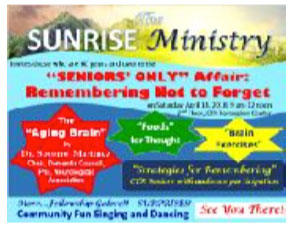 The Sunrise Ministry, headed by Doy and Estrelle Lopez, held the first seniors only event for 2018 last April 14 at the CTK Formation Center. Nearly a hundred seniors attended.
The Sunrise Ministry, headed by Doy and Estrelle Lopez, held the first seniors only event for 2018 last April 14 at the CTK Formation Center. Nearly a hundred seniors attended.
The theme of the gathering was aptly called ‘Remembering Not to Forget’ and focused on the brain and how to keep the seniors’ mental faculties intact. Dr. Socorro Martinez, a neurologist and Chair of the Dementia Council of the Philippine Neurological Association, was the guest speaker and she talked about the changes in our brain as we advance in years. She also gave strategies for remembering.
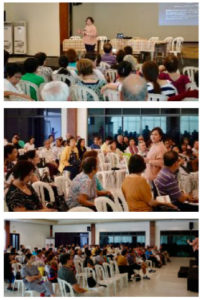 Dr. Martinez began with some interesting statistics – e.g., the human brain weighs three pounds and is the size of a medium-sized cauliflower. Our small brain holds hundred billion neurons and a hundred trillion synapses. Unfortunately, as our bodies age, our brain also ages, that is, a decrease in the frontal cortex, changes in the medial temporal area, and changes in the parietal lobes. This leads to several degradations:
Dr. Martinez began with some interesting statistics – e.g., the human brain weighs three pounds and is the size of a medium-sized cauliflower. Our small brain holds hundred billion neurons and a hundred trillion synapses. Unfortunately, as our bodies age, our brain also ages, that is, a decrease in the frontal cortex, changes in the medial temporal area, and changes in the parietal lobes. This leads to several degradations:
a. Confusion with me and place
‣ lose track of dates, seasons, and passage of Fme
‣ forget where you are or how you got there
‣ forget what you did three years ago or what you ate this morning
‣ Trouble understanding something if not happening at the immediate moment
b. Problems with words
‣ difficulty in following or joining a conversation
‣ may stop in the middle of a conversation and have no idea how to continue or may start again
‣ not finding the right words or calling things by the wrong name
‣ words ‘at the tip of the tongue’
c. misplacing things and losing the ability to retrace steps
‣ putting things not in their usual places and then forgetting where you put them
‣ accusing someone of stealing things
d. Withdrawal from work or social activities
‣ remove themselves from hobbies, social activities, work projects, or sports
‣ trouble keeping up with favorite sports or remembering how to complete a favorite hobby
e. Changes in mood and personality
‣ can become confused, suspicious, depressed, fearful, or anxious
‣ may be easily upset at home, at work, with friends, or in places where they are out of their comfort zone
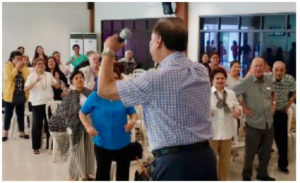 The good news is that some things do not degrade, such as – verbal IQ, vocabulary, and comprehension.
The good news is that some things do not degrade, such as – verbal IQ, vocabulary, and comprehension.
Dr. Martinez confirmed the analogy of the brain to a hard drive. As we get older, storing of new information is hampered by distraction and interference, while retrieval is hampered by slower processing. However, she did clarify that unlike most hard disks, the brain’s storage capacity is never an issue given the hundreds of billions of neurons.
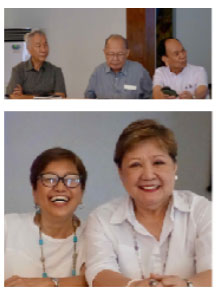 Dr. Martinez highlighted that slight cognitive impairment is normal as we, as well as our brains, grow older. But 24% of the population will degrade into Mild Cognitive Impairment (MCI) where some cognitive domains are significantly impaired that will begin to concern both the individual and the family members but daily living activities are not hampered. However, 12% will continue degrading to Alzheimer’s Disease or other forms of dementia where cognitive impairment becomes severe enough to interfere with everyday abilities.
Dr. Martinez highlighted that slight cognitive impairment is normal as we, as well as our brains, grow older. But 24% of the population will degrade into Mild Cognitive Impairment (MCI) where some cognitive domains are significantly impaired that will begin to concern both the individual and the family members but daily living activities are not hampered. However, 12% will continue degrading to Alzheimer’s Disease or other forms of dementia where cognitive impairment becomes severe enough to interfere with everyday abilities.
Dementia has long been a problem in developed countries but its effects are now being felt in the Philippines as nearly 10 million Filipinos are now over age 65.
But there are ways and techniques to forestall the quick progress of dementia. This includes:
a. challenging yourself with new activities
‣learning a new language
‣playing a new musical instrument
‣learning a new game or craft
‣googling more often
‣travel and exploration
b. move and groove, i.e., physical exercise
‣aim for 30 minutes physical activity or exercise five times a week – walking, swimming, ballroom dancing
‣build muscles with strength training
‣add balance and coordination exercises – taichi, yoga
c. practice positive thinking until it becomes the default
‣ look forward to each new day
‣ avoid stress and anxiety
‣ laugh more
d. get a good night’s sleep
‣sleep for at least six hours to avoid dangerous visceral abdominal fat
‣ take half-hour power naps to pep up mental functioning
‣ seek treatment for sleep disorders
e. know and keep the right ‘numbers’
‣ blood pressure between 100-120 and70-80
‣ FSB at 100 mg/dl or HbA1C < 5.5.
‣ bad cholesterol < 150 mg/dl
‣ body mass index of 18 to 25
When communicating with a person with Alzheimer’s, Dr. Martinez advises:
‣ agree, never argue
‣ redirect, never reason
‣ distract, never shame
‣ reassure, never lecture
‣ reminisce, never say ‘remember’
‣ repeat, never say ‘I already told you’ ‣ say ‘do what you can’, not ‘you can’t’
‣ ask, never command
‣ encourage and praise
‣ reinforce, never force
There was also humor interjected into Dr. Martinez’ talk, such as the Senility Prayer:
God grant me the senility to forget those people I never liked anyway,
The good fortune to run into those I do like, And the eyesight to tell the difference. Amen.
After the well-received lecture which was marred by the malfunctioning sound system, Doy Lopez got the entire group up to do some exercises. He then called the five senior panelists up to the stage to take their seats and share their tips and techniques for coping with memory difficulties and absentmindedness. Sharing their insights were: Francis Horn, Manolo Dayrit, Linda Famador, and Anna Lagman. This was followed by questions and additional sharing from the audience.
Interspersed throughout the morning were Foods for Thought as well as Brain
Exercises. There was also the traditional community fun singing and dancing as well as the usual surprises.
The final closing words was by organizer Doy Lopez who bellowed in his ringing voice:
Remember not to forget: God loves us unconditionally and always!
As people exited, the organizers gave away efficascent oil, donated by Manolo and Linda Dayrit, cookies baked by Jorge and Baby Banal, Katinko from Earth Kitchen’s Emma Yeun.
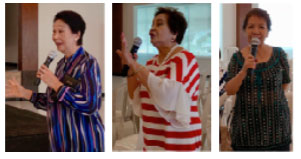 Dr. Martinez is a UST magna cum laude graduate of preparatory medicine and cum laude, UST Doctor of Medicine. She is also head of the St. Luke’s Institute for Neurosciences, former head of St. Luke’s Memory Center, head of Cardinal Santos’ Memory Clinic in the Brain & Spine Center, co-founder and former president of the Alzheimer’s Disease Association of the Philippines, and she is also a Certified Dementia Rater, accredited by the Washington University and the Alzheimer’s Disease Research Center in Missouri, USA.
Dr. Martinez is a UST magna cum laude graduate of preparatory medicine and cum laude, UST Doctor of Medicine. She is also head of the St. Luke’s Institute for Neurosciences, former head of St. Luke’s Memory Center, head of Cardinal Santos’ Memory Clinic in the Brain & Spine Center, co-founder and former president of the Alzheimer’s Disease Association of the Philippines, and she is also a Certified Dementia Rater, accredited by the Washington University and the Alzheimer’s Disease Research Center in Missouri, USA.
